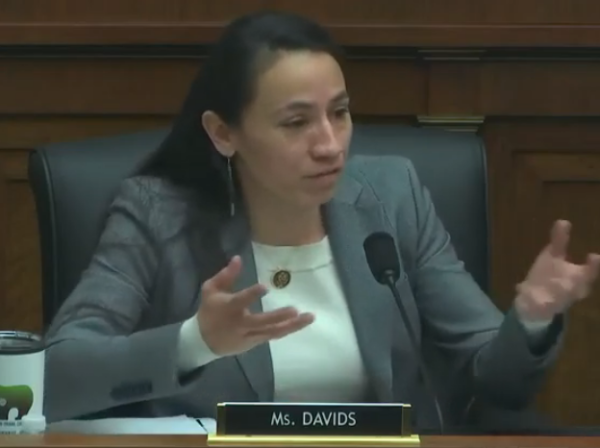
- Details
- By Native News Online Staff
WASHINGTON — Representative Sharice Davids (D-KS), one of the first American Indian women elected to Congress, has helped secure key provisions to improve tribal infrastructure in new legislation proposed by the House Committee on Transportation and Infrastructure.
H.R. 2, the “Investing in a New Vision for the Environment and Surface Transportation in America Act’’ (INVEST in America Act) would boost total transportation spending to $1 billion per year and would predominantly support rural areas. The bill is sponsored by Rep. Peter A. Defazio (D-OR), chairman of the Transportation and Infrastructure committee.
“The INVEST in America Act will make critical, long over-due investments in tribal infrastructure - something I’ve been pushing for since I first began serving on the Transportation and Infrastructure Committee,” Davids said in a statement. “Amid the COVID-19 pandemic, which has disproportionately impacted tribal communities, we must invest in infrastructure in order to advance economic recovery and create much-needed jobs. I’m proud to support this legislation, and I look forward to working with my House colleagues to move a bipartisan bill forward.”
Last year Davids urged committee leadership to include tribal communities while developing their legislative agenda for the 116th Congress. She advocated for reforming the Tribal Transportation Program and making existing infrastructure grants more accessible to tribes.
"The INVEST in America Act puts forward a vision for our nation that moves our infrastructure into a new era, in part, by recognizing the long overdue need to invest in tribal communities,” Chairman Defazio said. “From the start of this Congress, I've had the pleasure of working with Representative Davids to ensure that our Committee serves as a proving ground for the greater inclusion of tribal voices in Federal policy. As the first member from Kansas to serve on the Transportation and Infrastructure Committee in nearly a decade, Representative Davids played a critical role in securing key provisions that will build and repair roads on tribal lands, significantly increase funding for the Tribal Transportation Program, and boost tribal economies and create jobs - which is especially important amid COVID-19."
The INVEST in America Act would help tribes recover from COVID-19 and enact many measures Davids has advocated for to improve tribal infrastructure, including:
- COVID-19 Recovery: Provides $83.1 billion to ensure tribes, states, cities, territories, and transit agencies can administer programs, advance projects, and preserve jobs in the aftermath of the COVID-19 crisis.
- Invests in Highways: Provides $750 million for tribes in formula funds per year, a nearly 70% increase over current levels.
- Tribal Transportation Program: Increases funding levels for the Tribal Transportation Program (TTP), providing $800 million per year for the program out of the Highway Trust Fund. Expands eligibility under the Tribal Transportation Bridge Program to allow construction of new bridges.
- Federal Lands and Tribal Major Projects Program: Provides $400 million per year and requires a 50/50 split of grant funds among tribes and Federal lands agencies. Provides more flexibility through a smaller project size, higher Federal share, and a broader set of funding eligibility.
- Tribal High Priority Projects: Provides $50 million per year on a discretionary basis, for grants of a maximum size of $5 million, for the highest priority project for tribes whose annual apportionment is insufficient. Provides emergency relief to tribes who can’t access other ER funds. Funds the program out of the HTF so funding is guaranteed.
- Establishes an Office of Tribal Government Affairs: Establishes an Office of Tribal Government Affairs within U.S. DOT and creates a new Assistant Secretary for Tribal Government Affairs position. The Office and the Assistant Secretary will oversee administration of the Tribal Transportation Self Governance Program, policies and programs serving Indian Tribes and Tribal Organizations, and will provide technical assistance to tribes.
More Stories Like This
Native News Weekly (August 25, 2024): D.C. BriefsNative Bidaské: The Illusion of Freedom and the Myth of America 250, Leonard Peltier Speaks Out
Monday Morning (March 2, 2026): Articles You May Have Missed This Past Weekend
Native News Weekly (March 1, 2026): D.C. Briefs
Scope Narrowed, Report Withheld: Questions Mount Over Michigan Boarding School Study
Help us defend tribal sovereignty.
At Native News Online, our mission is rooted in telling the stories that strengthen sovereignty and uplift Indigenous voices — not just at year’s end, but every single day.
Because of your generosity last year, we were able to keep our reporters on the ground in tribal communities, at national gatherings and in the halls of Congress — covering the issues that matter most to Indian Country: sovereignty, culture, education, health and economic opportunity.
That support sustained us through a tough year in 2025. Now, as we look to the year ahead, we need your help right now to ensure warrior journalism remains strong — reporting that defends tribal sovereignty, amplifies Native truth, and holds power accountable.
 The stakes couldn't be higher. Your support keeps Native voices heard, Native stories told and Native sovereignty defended.
The stakes couldn't be higher. Your support keeps Native voices heard, Native stories told and Native sovereignty defended.
Stand with Warrior Journalism today.
Levi Rickert (Potawatomi), Editor & Publisher

